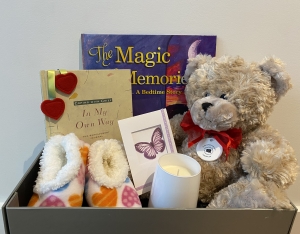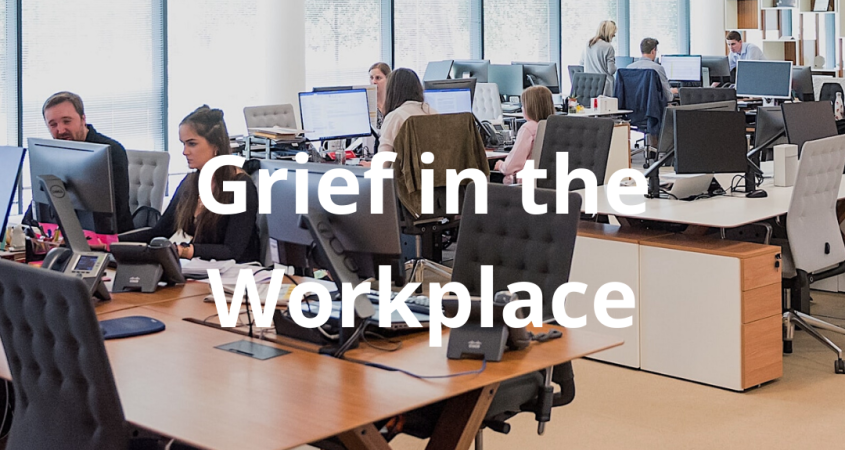Grief in the Workplace – A Personal & Professional Perspective
We stood in small groups, clad in respectful funereal clothes, exchanging wordless hugs and mopping tears. Words seemed inadequate to express intense feelings, thoughts too fleeting to gather into a coherent sentence. We lingered, not wanting to break comforting connections with friends and relatives who we saw so rarely – geographical distance relegating meaningful exchanges to weddings, funerals, and the odd email or text message.
Who would have the courage to make the first move? We should have known.
“Life must go on”, the atmosphere was suddenly penetrated by a familiar, businesslike voice, and we were briskly marshalled into the reception room near the funeral chapel. The caterers had done themselves proud, tables beautifully set, tastefully displaying a feast that tempted even those with the poorest appetites.
Plates loaded and glasses filled, people arranged themselves in small groups where they began catching up on each other’s news. Watching from the sidelines it seemed to me as if the dead person and grief had seemingly been forgotten, or perhaps just successfully tucked away in everyone’s haste to re enter the world of the living.
Of course life goes on – we all know that. When someone we love dies, we may feel as if our world has come to an end, and the world as we knew it has, at least temporarily, until we learn how to rebuild life around the empty space. But, for those untouched by our current sadness, life continues as if nothing has changed.
I think it’s the word must that I react to. It’s often pronounced like an insensitive order when a more gentle acknowledgement might achieve the desired outcome without stimulating rebellion. Reminders that life does indeed go on can be reassuring at a time when our world feels out of control, but the timing and content of the reminders are important. And of course, the person who delivers the message even more so.
 I live near water, and at times when I have lain awake in the night, grieving, the sound of water birds living their nocturnal life has felt comforting, taking me in imagination into a natural world with its own order, its own set of rules and relationships. Those sounds somehow manage to reduce the kind of night-time loneliness experienced by grieving folk everywhere. At those times, I’m glad that life is still going on without me having to do anything about it.
I live near water, and at times when I have lain awake in the night, grieving, the sound of water birds living their nocturnal life has felt comforting, taking me in imagination into a natural world with its own order, its own set of rules and relationships. Those sounds somehow manage to reduce the kind of night-time loneliness experienced by grieving folk everywhere. At those times, I’m glad that life is still going on without me having to do anything about it.
Life Going On
In the early days, weeks and months of acute grief, life going on may simply mean dealing with the basic tasks of survival. Somehow, most of us manage to get up each morning, shower and dress, eat easily digested food or suffer from grief related indigestion, and carry out necessary household tasks. If we have young children, their needs have to be met and some kind of order and routine re-established. Shopping and washing still have to be done, the house cleaned, lawns mowed, and bills paid.
No matter how much compassionate leave we are given, or choose to take, returning to work presents difficulties for most of us. As we grapple with our own thoughts and feelings, it’s easy to overlook the fact that our colleagues may also be affected by our grief. For some, it may stimulate regression and fears of contagion; for others, awkwardness because they don’t know what to do or say, and a few insensitive souls in some work places may fear that grief will impact on productivity.
Many life events, including those that stimulate excitement, may have an impact on productivity, at least temporarily. Life happens, and we tend to manage the impact of life events best if we are prepared. We need to acknowledge that people in the workplace fall in love, move in together, get married, have children, fall out of love, separate, divorce, have affairs, move house, and have accidents.
Our colleagues and their families may become seriously ill, experience disappointment, failure, distress, anxiety, depression, homesickness, and bereavement. Some may feel undervalued, and lose a sense of meaning and purpose. Fortunately, humans overall are impressively resilient – we learn to live with all that life throws our way – its highs and lows – if the environment in which events occur is emotionally compassionate and practically supportive.
Life Going on in the Workplace
Not all that long after the funeral I mentioned earlier, we, at ‘A Friend’s Place’, experienced the death of two colleagues. The first was of a relatively young man, a counsellor we were training to co-lead the Centre after my husband and I retired. He was loved and valued by all who knew him and respected for his intelligence, compassion and competence. His death occurred after a sudden relapse following a bone marrow transplant that gave him the bonus of almost three years of life – years he used well, with awareness and gratitude.
All members of the team were included in his illness, recovery, relapse, dying and death, and each contributed in whatever way possible. When Pete died, most of us attended his funeral. We later met as a team to process our reactions – to share our individual and collective stories of special times with him, to acknowledge what he had contributed to the environment of the Centre, the service we all provided, what we would remember, what we would miss most, and how we might memorialise him in the future. Pete was an adventurer, very physically active and competent, a family man who loved children, and who had himself been a bereaved child. So, the adventure camps for bereaved children that have been held annually in his honour since that time seem a very fitting memorial. A family camp was added to the memorial last year.
Six weeks after Pete Died, while we were still so newly affected by grief, another young male colleague died suddenly and unexpectedly while playing sport. Michael was a support worker in groups run at the Centre and willingly and uncomplainingly travelled two hours each way on group nights to make a valued contribution to the Centre’s service. He was held in great affection by his colleagues, and the kids loved his dry sense of humour and sporting ability. Once again, we gathered as a team to attend his funeral, and once again we gathered as a group to process our reactions. Just as we had after Pete’s death, we shared memories of times experienced with Michael, acknowledged what we valued and would miss, and how we might appropriately memorialise him in the future. We have yet to decide on the how and the where, but thinking along those lines continues.
Those of you who have read my other blogs know that a third colleague, Ann, died eighteen months ago as a result of cancer. Ann was our most senior counsellor, a trusted and loved colleague and friend who had worked alongside us for 33 years. A former nurse, and clinical psychologist, Ann’s contribution to our training and supervision program was invaluable, and she shared our teaching commitments. We will eventually decide on a fitting memorial for Ann.
All three of these special people have left an indelible imprint on our lives, the lives of their clients, and on the Centre environment. Framed photos of them, grouped together, provide a spot for colleagues to pause occasionally, look at their smiling faces, and remember. We talk about them all, much as other folk do when they gather round the water cooler in office breaks, and reminisce, laugh about funny memories, and still occasionally share warm tears. We will never forget them, and never stop appreciating their contribution to our lives and the life of the Centre.
As I write this, I’m wondering what happens in your work place when a colleague dies, is terminally ill, or suffering from a crisis in their lives? How are they supported? How are you supported? Are you given time and space to share thoughts and feelings, to process reactions to events that affect you? Are colleagues memorialised in some way when they die? Or do people avoid talking about death because it’s considered a morbid topic?
Research has shown that productivity tends to decrease and health problems increase when people are forced, often simply as a result of non verbal, environmental pressure, to maintain a stiff upper lip and just get on with life.
For some folks this way of coping serves them well, but for many others, restraining thoughts and feelings is not in their best interests in the long term.
As in most life situations, balance is what works best in the work place – a time to feel, a time to think, and a time to act. How do we achieve this balance? Where do we start?
At the very Beginning – A very good place to Start
As with many things in life, forward planning is a good idea. We can begin by preparing the workplace before significant life events occur.
Ideally, all work places would have a couple of carefully selected people trained to provide peer support, along with an emotional FIRST AID KIT in addition to a first aid kit to care for physical aches, pains and injuries. I mentioned earlier that many life events, including those that are potentially happy, can create a time of turbulence and change. For that reason, the emotional first aid kit could contain:
- The names of those able to provide peer support or counselling in the workplace and how to contact them
- Details of support services for new parents
- Pamphlets that address management strategies for anxiety and depression
- Phone numbers for general counselling services and support groups
- Pamphlets that explain grief after bereavement and how to manage its manifestations
- Phone numbers for bereavement counselling services
- Phone numbers for relationship counsellors
- Support services available through local community health centres and hospitals
- A ‘time out’ place where colleagues could shed tears if necessary, and regain a sense of control and dignity. These special spaces could contain a set of headphones that would enable music or visual images to be used as a distraction from internal distress. They could also have a water cooler or tea/coffee facility, and pens and paper so thoughts or needs could be externalised and listed.
Preparation for a Bereaved Colleague’s return to the Workplace
While I am well aware that any of the life events I have already mentioned may initially create difficulties in the workplace, for the person affected, their colleagues, and those in management roles, I’m going to focus on the impact of grief after bereavement and leave you, the reader to extrapolate for other life events.
When we learn about a colleague’s bereavement we may initially feel stunned, particularly if the death was sudden and unexpected. The death of a child or partner is likely to stimulate fear as we imagine, even for a moment, the death of those members of our own close family who are central to our sense of security and well being. What if this happened to us? How would we cope? Have we told our partners and children what they mean to us, or told them often enough? What unfinished business do we have? Has work used up too much of our time and energy? Do our family members feel as if they play a poor second to our ambitions?
Painful as this kind of self-questioning may be, it can be productive, and in the long term may stimulate us to become more expressive, and to create a healthier work-life balance.
 Those at the helm of an ideal workplace may anticipate some of our reactions and provide opportunity for colleagues of the bereaved person to gather together to discuss thoughts and feelings. If there is sufficient trust in the environment, it will be okay to express emotional responses and fears for our own families. We may then talk about the bereaved person, our knowledge of them, our concerns, and what we might do to help them personally and professionally.
Those at the helm of an ideal workplace may anticipate some of our reactions and provide opportunity for colleagues of the bereaved person to gather together to discuss thoughts and feelings. If there is sufficient trust in the environment, it will be okay to express emotional responses and fears for our own families. We may then talk about the bereaved person, our knowledge of them, our concerns, and what we might do to help them personally and professionally.
What’s the protocol here? What boundaries are there? What might Bill or Mary want us to do for them? What might a dying colleague hope we might do for their surviving family members? Do we all go to the funeral, or send a representative? What do we say to Bill or Mary when they return to work? How can we make it easier for them?
Let’s back peddle a little. Ideally, all work places would have a session about grief before the need arises. We can all benefit from understanding what grief is, how it manifests, how long it lasts, and what people need in the short and long term. A great idea, but I’m realistic enough to know that it will be the very rare workplace indeed that sees this kind of forward planning as anything other than self indulgent. Australians, after all, are meant to be tough – a mix of the ‘mother country’s’ example of stiff upper lip, and the resilience it has taken for our forefathers to survive in a harsh climate, distant from greener pastures and the support of family and friends. We are meant to suck up whatever hand life deals us and just get on with it.
That said, let’s explore how much of the ideal might be possible.
When a colleague is bereaved, it’s important for a designated person to contact them, acknowledge the death, and express concern on behalf of colleagues. This person might let the bereaved person know that some or all of their colleagues will be attending the funeral, that X amount of compassionate leave is available, and that they are welcome to take more time if that will help. The caller may also assure them that a further phone call will be made prior to them returning to work.
During the follow up phone call the designated staff member might ask the bereaved person what would be most helpful when they return to work. ‘What could I/we do to make things easier for you?’ If the bereaved person’s work role involves issues of physical safety, or intellectual challenge, it might be helpful for someone to work alongside them until their confidence gradually returns. It’s important that any help given is done so with compassion and doesn’t make the bereaved person feel patronised or criticised.
In other blogs I’ve mentioned that in my particular workplace we ask colleagues ‘how do you want to be treated at work? Do you want us to show the compassion we feel, or save it until the end of the day when you don’t have to be professional?’ When asked that question my own answer has always been ‘don’t be too kind to me until I’ve finished work. Treat me as you always have.’
No matter how intelligent or competent we are, for the first year or so, most of us, when bereaved, periodically experience difficulty in concentrating, especially for long periods, and have difficulty retaining information. Colleagues can help by learning as much as possible about the nature of grief so they are able to say ‘when we are grieving, most of us have difficulty concentrating for long periods and for retaining information, so initially I/we may occasionally check any work that involves safety or accuracy. Checking will come from compassion and in no way implies a criticism. I/we, have every confidence that you’ll gradually return to your usual level of competence. If that doesn’t happen, or doesn’t happen in the time frame you prescribe for yourself, let me know and we can talk about how to help.’
Creating the right atmosphere in the Workplace
When we are bereaved, most of us find a degree of solace and respite in a familiar environment that doesn’t stimulate constant memories of the person we are grieving. Work, which involves the need to think as well as feel, can provide time out from the intense emotions of grief that may overwhelm us at home, where everything seems to be a memory. That has certainly been my experience.
As colleagues of a bereaved person, we need to avoid any temptation to adopt a kind of funereal seriousness in the caring, but mistaken belief, that we will seem insensitive if we laugh appropriately at humour. Most of us, when bereaved, need colleagues to be as natural as possible so that we don’t feel different, or abnormal, and can gradually re-find our place in the team.
When a Work Colleague dies or faces life threatening illness
When a work colleague dies, or is facing terminal illness, the work place doesn’t always provide the kind of respite or solace I have described, but it can certainly meet other needs. I’ll start with terminal illness.
Life threatening illness
Many of the things I have said, or will say about care of bereaved colleagues, also apply to a colleague who is facing terminal illness. We can express our thoughts and feelings of concern, ask what might be most helpful for them in the workplace and at home, and, if they are unable to think of anything, we could offer suggestions that include choice. For example ‘would you prefer me to do X or Y?’ Keep choices simple and limit to two or three. We can use text messages and email to remain connected and supportive without being intrusive, or taxing the sick person’s energy. These simple connections can be invaluable.
We need to talk naturally, and ask questions that come from genuine concern and interest, while avoiding futile attempts to fix the unfixable. Unless specifically invited, we need to resist any temptation to lay a heavy blanket of positive thinking, philosophy or religion on our colleague – behaviour that results from a need to address our own feelings of helplessness and rarely meets theirs.
When facing death, most people say they benefit from being in the company of people who are not afraid to bear witness to their emotional and physical pain, and who will bravely ask questions that help to bring fears out into the light of day, and provide appropriate distraction from pain at the right time. The aim of questions and comments, while expressing our truth, should always be to meet the other person’s needs, not our own. And, if anyone reading this is ever stuck for the right words, a phone call to ‘A “Friend’s Place’ can be helpful.
After the Death of A Colleague
The death of a colleague can be confronting, especially if they are of similar age to us. If they can die, so can we. If they have left a grieving family of young children behind, so might we. The fragility and brevity of life ceases to be an intellectual concept and moves to the foreground of our thinking.
The familiar dynamic of the workplace changes as a result and is best addressed by gathering together those most affected so that thoughts and feelings about the deceased person can be shared, and their role acknowledged and valued. Management strategies might be explored to help everyone deal with feelings of grief as they are stimulated on a day-to-day basis.
Arrangements might be made for those most affected to attend the funeral and ideas about potential family gifts explored. After the funeral, the team may decide on a way to memorialise a colleague, sending an important message to everyone that we all remain important, even in death, and will not be forgotten.
Things to say and do when a bereaved colleague returns to the workplace
THINGS TO SAY
In our initial conversation, it’s important to tell our colleague that we care, if that’s our truth. For example ‘I wish there was something useful I could do to help, but probably all I can do at the moment is care. If you ever want to talk, I’m here to listen.’ It’s important that we include a bereaved colleague in social invitations as long as we don’t have an ego investment in the answer. For example ‘I’m playing golf on Sunday and you’re welcome to join me if you feel up to it. I’ll understand if you don’t.’ We shouldn’t let refusals put us off asking in the future – it takes time for most of us to re-enter life. Investing in life again requires energy that may be in short supply during the first year or so, and many people initially feel guilty about enjoying life when a loved person has died and is deprived of pleasure.Questions can be helpful. We might say ‘how are you doing mate? I’m imagining it might be pretty tough having to concentrate or just put one foot after the other.’ We might get a noncommittal answer like ‘fine’, a shrug of the shoulders, or a gesture that indicates that life is indescribable at the moment. If the answer is ‘fine’, we might add ‘how would I know if you weren’t?’ Saying ‘I’ll check in from time to time to see if I can help in any way’ is better than ‘let me know if I can help.’ Most bereaved people find it hard to ask for help. Instead, we need to be specific with our offers and be prepared to have them declined. For example, we might say ‘I’m taking my kids to watch a soccer game at the weekend and wondered if you and your kids would like to join us, or if you’d prefer, I could pick your kids up to give you and your wife a break?’ Don’t offer help that can’t be sustained. Be realistic about what you can contribute in the long term.
Telling a colleague we know how they feel is likely to go down like a lead balloon, because we don’t, but we imagine. You might say ‘In your circumstances I imagine I’d probably feel like punching someone or something, but I know we all react differently. How is it for you?’
Helpful gifts for a Bereaved Colleague
Many people want to send a gift to a bereaved colleague or their family but have difficulty thinking of anything suitable, so I’ll list a few things as a starting point.
It’s important to know enough about a bereaved colleague’s personality, likes and dislikes to be able to choose the right gift. Choices will also be influenced by available finances, so the lists below cover the spectrum from inexpensive to luxurious. I’ll also categorise ideas for men, women, children and families, while acknowledging that many might be interchangeable.
Gifts for women
- Flowers that last – a sturdy pot plant that requires little attention but is beautifully presented
- A journal to record thoughts, feelings and memories
- Sensory indulgences like gift vouchers for massage, pedicure or manicure
- Books – to read when concentration returns
- A photo frame – for a photo of the person who died
- A locket for a photo
- A throw rug, slippers or socks that feel like velvet
- A book on how to create a memory or sacred garden
- A promissory note that offers help with housework or child minding
- A commitment to providing a meal once a week for the next 3 months
- A commitment to accompanying the bereaved person to the gym, walking, for coffee and a chat …once a month for the next 12 months
- A voucher for bereavement counselling – anything from one to six sessions
- Notes and cards from time to time expressing thoughts and feelings
- Text messages
Gifts for Men
- Books about how to manage grief – eg. ‘Coping With Grief’
- Offers to help with home maintenance chores – make a genuine commitment to do things ‘with’, not for
- Invitations to sporting events
- A commitment to go together to the gym, walking or jogging once a week for 3 months or once a month for a year
- Books about interests or hobbies that can be read when concentration becomes easier
- A magazine subscription
- A shirt or sweater in fabric that is soothing
- Commitment to a get together for a coffee, beer, meal and a chat once a month for the next 6 months
- A voucher for bereavement counselling – from one to six sessions
- Text messages
Gifts for families
 A ‘CARE’ package from the NCCG – contents determined by family composition and the amount you want to spend. The NCCG will ensure that the gift is beautifully presented and delivered by courier if requested
A ‘CARE’ package from the NCCG – contents determined by family composition and the amount you want to spend. The NCCG will ensure that the gift is beautifully presented and delivered by courier if requested- Vouchers for bereavement counselling – children from 3-18 are seen free at ‘A Friend’s Place’ but there is a fee for adults
- Offers of child care so that parents can have time out
- Offers of child care so that parents can have special time with each child – on their own
- Offers to take children to and from school or to sporting events
- Offers of help with household chores
- A meal delivered once or twice a week for six months
- A weekend away for the whole family – probably somewhere from 6-12 months after the death
- Notes and cards at irregular intervals expressing thoughts and feelings
- Phone calls at irregular times – don’t begin what you can’t continue
- Text messages and email
- Books – suggestions can be obtained from ‘A Friend’s Place’
Important Things To Remember
- Grief never ends – people learn how to live with it – how to build life around it
- When the relationship the bereaved person had with the deceased was central to their identity and sense of well being, it is likely to take from 4-7 years for them to regain a strong sense of meaning and purpose
- Happiness and sadness can co-exist; in fact, all emotions can co-exist. Carrying the sadness of grief doesn’t prevent most people from living full and productive lives
- Grief has its own time line and becomes background more readily when the bereaved person feels understood, supported and valued.
Responsibilities of the Bereaved person in the Workplace
This heading may seem in contradiction to all that I have said so far about bereaved people needing to receive compassionate understanding, support and meaningful roles in the workplace. In other words, I’ve emphasised what they need to receive, not what they have to give.
I know from my own personal and work experience that when we include people in our life by telling them the truth about what we are experiencing, they are more likely to be supportive. We need to let colleagues know that we’re feeling ‘down’, angry, worried, ill, in pain and let them see that we’re in need of support. lf we breast our cards, people feel shut out, and helpless. They are certainly helpless to ‘fix’ grief, mainly because it isn’t an illness or a problem, but they can certainly facilitate the process of helping us learn how to live with it. We are all in this life together, most of us struggling in one way or another to do the best we can. If we can’t find the words, we can write them – we can tell people what would help us most. And if you are as fortunate as I have been in times of need, you will find that the majority of people are very willing to give you the best of themselves.
Final Thoughts
If you are grappling with your own grief in the workplace, or running out of ideas to support a bereaved colleague, help is available from the best workplace I know – ‘A Friend’s Place’.
Help
Help is always available – at ‘A Friend’s Place’ or by contacting our outreach service.
Dianne McKissock OAM
NCCG Outreach Support Service
Email support for dying and bereaved people and anyone involved in their care






